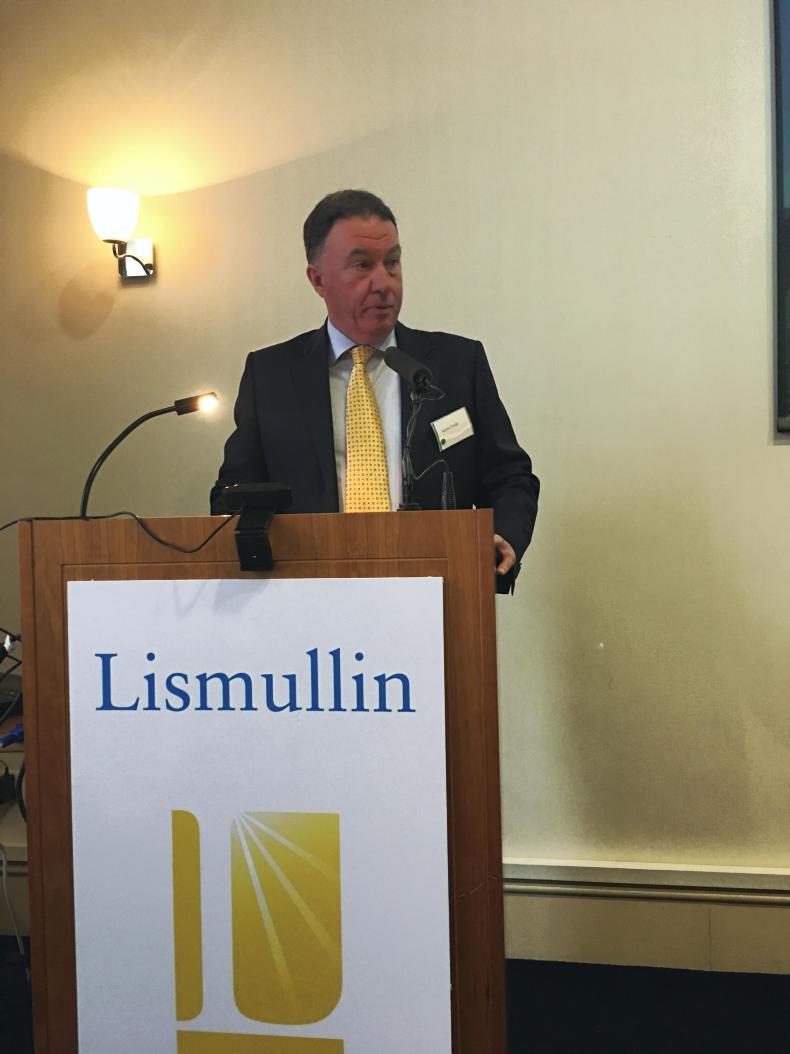This year's Lismullin farming conference had a Brexit theme, with sector impacts provided by Aurivo's chief executive Aaron Forde on dairy,
Irish Farmers Journal markets specialist Phelim O’Neill on beef and sheep and Professor Jimmy Burke from UCD on tillage.

The dairy sector has a reasonably wide spread of markets and is therefore less exposed to the UK, which is responsible for just 23% of its sales. However, the border will present difficulties for the many companies who source milk either side of the border.
This year's Lismullin farming conference had a Brexit theme, with sector impacts provided by Aurivo's chief executive Aaron Forde on dairy, Irish Farmers Journal markets specialist Phelim O’Neill on beef and sheep and Professor Jimmy Burke from UCD on tillage.
 The dairy sector has a reasonably wide spread of markets and is therefore less exposed to the UK, which is responsible for just 23% of its sales. However, the border will present difficulties for the many companies who source milk either side of the border.
The dairy sector has a reasonably wide spread of markets and is therefore less exposed to the UK, which is responsible for just 23% of its sales. However, the border will present difficulties for the many companies who source milk either side of the border.
Irish dairy 20 years in the US
Aron Forde (pictured) presented interesting angles on the US market. Firstly, it is now 20 years since the first entry of Irish dairy products there. That year, just 300t of Irish dairy products were exported to the US. The beef industry has been disappointed with its development of that market since the first exports in 2015 yet in the first year over 1,000t of beef were exported.
While it took 20 years to build the US market for Irish dairy products, they have now bought into the Ornua brands with the well-established Kerrygold leading the way.
With the UK accounting for over half of Irish beef sales, Brexit will have an impact, the only question is how great
The presentation on beef focused on just what a hard Brexit would mean for Irish cattle producers. While it is hoped that trade between Ireland and the UK will continue as seamlessly as possible, the reality is that with the UK accounting for over half of Irish beef sales, Brexit will have an impact, the only question is how great. While many don’t expect the worst case scenario, defaulting to WTO tariffs, this doers need to be considered as the votes on Brexit and the US election weren’t expected either.
Professor Burke also highlighted the impact WTO tariffs would have on the grain sector. Yet its greatest difficulty will probably come from the cross-border trading of meal, with so many businesses operating either side of the Irish border. He also emphasised that while the Irish arable sector had grown yields over the years, there was much more that could be done to increase them further.
Farming politics was covered by Mairead Mc Guinness MEP. She was concerned that the reforms for the next CAP wouldn’t be radical enough as the current CAP wasn’t satisfying anyone. She challenged the audience to give policy makers like herself a clear steer on what would work and explained how fragmented the suggestions offered to her and her colleagues in Brussels were.
Insufficient mental health support
The human side of being a farmer was tackled by Mairead Lavery from the Irish Farmers Journal and Nuffield Scholar Joseph Leonard. He highlighted how big psychological issues could become for farmers, who are reluctant to say they are unwell. He said that while farmer training had strong health and safety messages with advice on how to avoid physical injury, there was nothing that dealt with the farmer's mind.
Mairead Lavery explored the nature of the family farm in depth, from the ideal of the winners of the Irish Farmers Journal/FBD best kept farmyard awards to the harsh reality of many farm units struggling to survive on a meagre income. A particularly poignant contribution came from the floor, with a lady explaining how she worked full-time off-farm with her entire income being required to sustain the family in addition to the difficulty of managing household chores while her husband managed the farm and invested any revenue that it generated in the business.
Read more
10 lessons from Navigating Global Trade conference
Full coverage: Brexit
 The dairy sector has a reasonably wide spread of markets and is therefore less exposed to the UK, which is responsible for just 23% of its sales. However, the border will present difficulties for the many companies who source milk either side of the border.
The dairy sector has a reasonably wide spread of markets and is therefore less exposed to the UK, which is responsible for just 23% of its sales. However, the border will present difficulties for the many companies who source milk either side of the border. 






 This is a subscriber-only article
This is a subscriber-only article











SHARING OPTIONS: